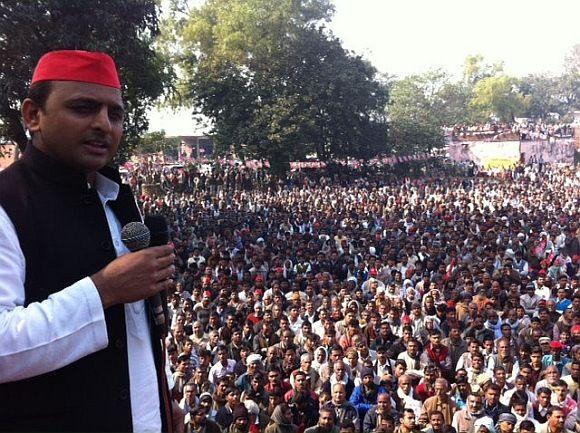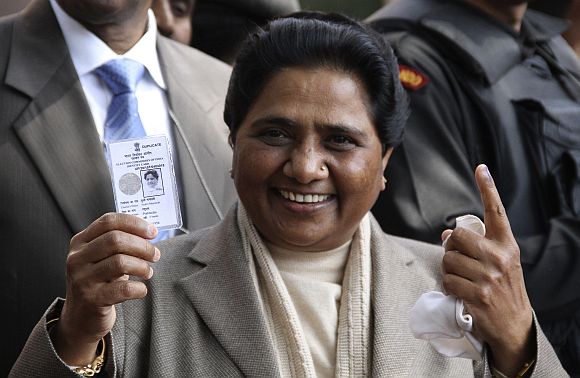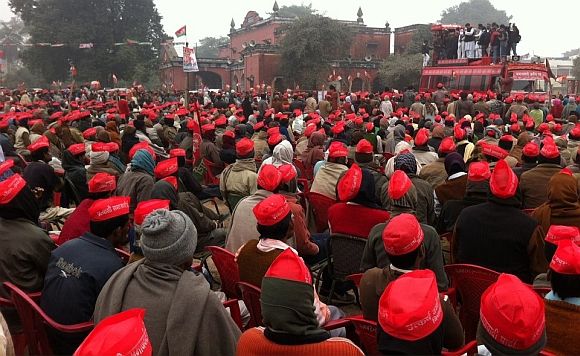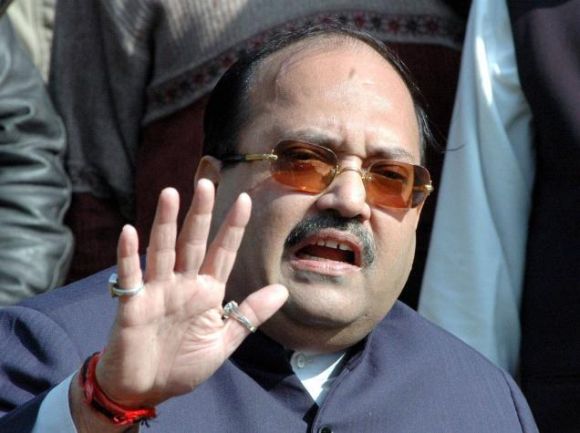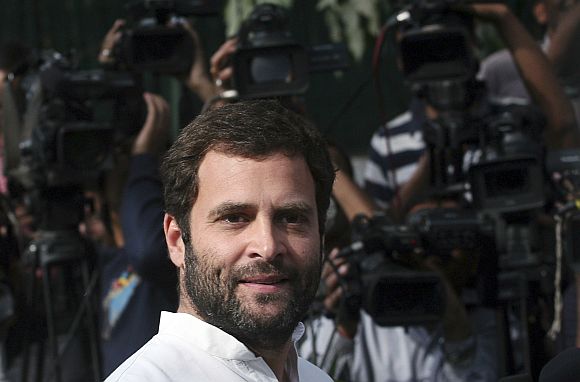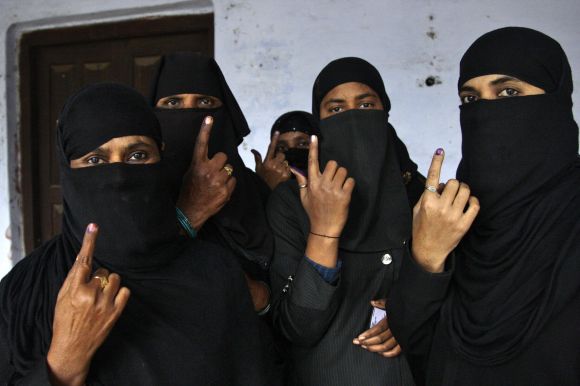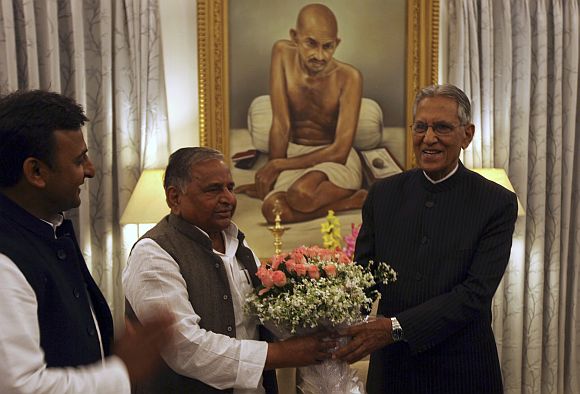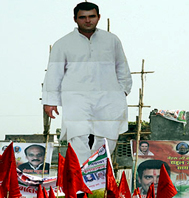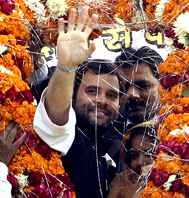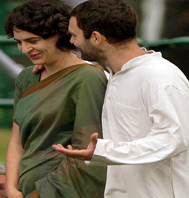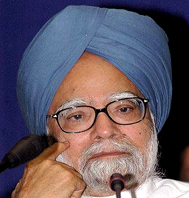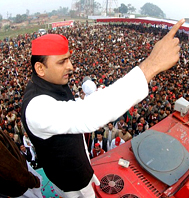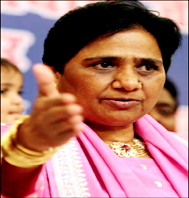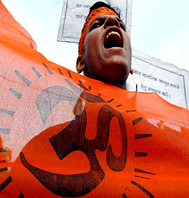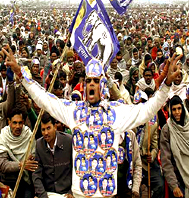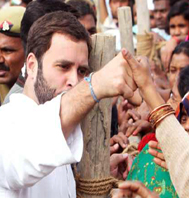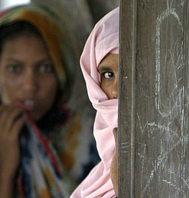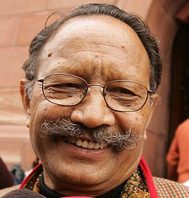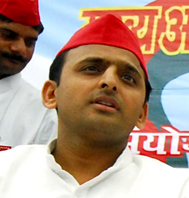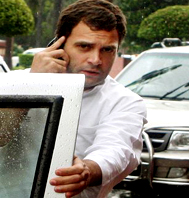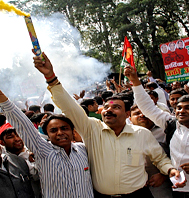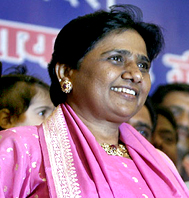 | « Back to article | Print this article |
Akhilesh's honest 'sorry' worked well with UP voters
With some gestures and promises, to an average electorate, Akhilesh Yadav appeared to be harmonising socialism with the changed economic realities of post-liberalisation India, even though he is yet to be counted as a visionary, notes Mohammad Sajjad.
The Samajwadi Party's spectacular and unprecedented massive victory in India's most populous province of Uttar Pradesh has provoked various shades and strands of analysis and interpretation.
The high stakes of the Congress party in this province is an equally influential factor behind the kind of attention and importance this election has got.
More important than that is the fact that attempts of communalising politics by the national parties have been rejected by the electorates in a much mature way.
Cross-sections of both Muslims and Hindus voted largely in defiance of the stereotypes that have been reinforced in UP, more particularly since 1989.
Despite division of Muslim votes along the lines of the Samajwadi Party, the Bahujan Samaj Party, the Congress and Muslim political outfits, the Bharatiya Janata Party ended up more as a loser.
Mohammad Sajjad is an assistant professor, Centre of Advanced Study of History, Aligarh Muslim University.
Please click NEXT to read further...
Non-Jatav Dalits deserted Mayawati
A fairly good number of pollsters and poll observers knew it too well that there was huge anti-incumbency against the Mayawati-led government.
More informed scholars of Dalit politics like Badri Narayan have been reporting that non-Jatav (lower sections) Dalits were deserting Mayawati.
Moreover, her obsession with installing her own statues and those of her election symbol, the elephant, in the sprawling parks, that too at the cost of neglecting concrete issues of economic uplift and educational-political empowerment, was disenchanting her core support base, particularly in the rural areas.
There were divided opinions pertaining to her performance on the front of governance, as to whether it was better or worse than her predecessors.
Please click Next to read further
Yadav Jr silently galvanised his party
A less reported aspect is the fact that for the last three years or so, Mulayam Singh's son Akhilesh Yadav was, silently but with great perseverance, doing a lot towards galvanising his party, both organisationally and to some extent ideologically as well.
In 2009, his wife Dimple had lost the parliamentary by-election against the Congress nominee, film star and once a Samajwadi Party leader, Raj Babbar, in Ferozabad.
Since then, Akhilesh Yadav, the Samajwadi Party state president, started working towards weeding out the liabilities among the party's top leadership. Akhilesh, a graduate in environmental engineering (from Mysore) and in business administration (from Australia) started whirlwind tours across UP, meeting and recruiting cadres, developing personal contacts with cross sections, making himself affable and accessible.
He remained magnanimous in accepting all the past mistakes of the Samajwadi politics and governance. He kept saying 'sorry' to his electorates, exhibiting a degree of sincerity.
Please click Next to read further
Amar Singh's image had alienated many in the Samajwadi Party
Scholars of politics often say that a party in deep crisis inevitably falls back upon its core ideology in order to resurrect itself.
Amar Singh's image and style of politics had alienated the intelligentsia-activists of Lohiaite Socialism.
Akhilesh Yadav paid special attention to this malaise, started giving space to such elements, and having worked tirelessly on this aspect during the last three years or so, he saw to it that such elements are brought back to the Samajwadi Party fold with the kind of respect and accommodation they deserve.
This particular exercise helped Akhilesh become popular among campus youth who started believing that his politics is paying attention to their problem of unemployment.
The Samajwadi Party has gained 29 to 30 per cent of votes (224 seats) this election, partly defying caste, community, and sub-region. Identity politics has neither died nor diluted substantially, but that has combined with middle class aspirations.
Gradually, the ranks of the middle class are swelling perceptibly even among the hitherto marginalised identities.
With some gestures and promises, to an average electorate, Akhilesh Yadav appeared to be harmonising socialism with the changed economic realities of post-liberalisation India, even though he is yet to be counted as a visionary.
Please click Next to read more
Rahul didn't spell out schemes for UP's development
In contrast, Congress General Secretary Rahul Gandhi was not accepted by the electorates as one of them.
Occasionally landing in Amethi and Rae Bareilly, the Nehru family's traditional political pocket boroughs, by helicopter and returning the same evening was not taken seriously by the electorate, at least this assembly election.
Moreover, Rahul attacked the incumbent BSP regime mostly on the single issue of under-utilisation of funds meant for welfare schemes. He did not spell out concrete schemes of development specifically suited for different parts of Uttar Pradesh.
This is the reason why has the Congress faced such an ignominious drubbing even in the assembly segments of Amethi, Rae Bareilly and the adjacent parliamentary constituencies.
The Congress and BJP not only are increasingly becoming oblivious of the developmental agenda specifically suited for different parts of various provinces; their central leaders are also reluctant about changing the social composition of its regional leadership.
If at all the Congress strategists had to counter the Samajwadi Party's support base, it should have declared a non-Yadav backward caste leader as its chief ministerial candidate. That gesture could have created some trust in the electorate about the Congress's commitment to regional-social justice.
There is no dynamic, popular, local face of the Congress in electorally more significant provinces. Young leaders like Jyotiraditya Scindia, Sachin Pilot, Jitin Prasad are not allowed to emerge to the extent of their abilities, as there is a fear that they might grow politically taller than a relatively slow learner like Rahul Gandhi.
Please click Next to read more
Disastrous for the Congress: 4.5% reservations
In Bihar and in UP, the Congress went to the polls, 'borrowing' leaders (nay, rebels and often discredited) from the regional political parties. Even such leaders were not given adequate space and stature.
Open bickering between P L Punia, formerly of the BSP, and Beni Prasad Varma, formerly with the Samajwadi Party; outpourings of leaders like Salman Khurshid and Sriprakash Jaiswal; were added disadvantanges for the Congress party.
The party's near contemptuous attitude towards the Election Commission was also resented by the electorate.
More realistic and candid Congress leaders have frankly admitted these disadvantageous factors on various news television channels.
In this era of utter sycophancy -- which is a bane for the Congress -- the party should appreciate and accept these harsh truths and move towards corrective action.
Particularly more disadvantageous was the Congress sop of 4.5 per cent reservations for the religious minorities.
On the one hand, it annoyed the Hindu backward castes that their cake has been sliced further, on the other hand the Muslims thought the Congress party had limited the community only to 4.5 per cent rather than to 27 per cent reservations, that too clubbing Muslims with the educationally more advanced Christians and Sikhs.
It was too little and too late.
More helpful would have been an arrangement whereby out of the 68 'castes' among UP Muslims, only around 30, 35 'castes' were included as Other Backward Communities.
Then, following the 'Bihar Model' of reservations; splitting the whole quota into two parts -- segregated quotas for lower and upper OBCs -- would have been more helpful without making it appear communally divisive.
Delinking religion with the scheduled castes through a Presidential ordinance is another task to be fulfilled for more meaningful social justice.
Please click Next to read more
AMU's suspicion over Congress has a long history
The Muslim anger was made known to the Congress months before the electioneering started. The Aligarh Muslim University has historically been regarded as a profound political enterprise at least of UP Muslims, if not Muslims from other parts of India.
The Congress was seen to be brazenly protecting the tainted vice- chancellor. Angry mobs of teachers and students had disallowed Union Minister Salman Khurshid to enter the campus on October 17, 2011, the AMU founder's birth anniversary celebrations. Subsequently, the Congress had to cancel Rahul Gandhi's visit to Aligarh.
Yet, it did not let the Central Bureau of Investigation take any action against the VC; he was allowed not only to complete his tenure, but also provided a safe exit.
This anger was particularly reflected in the results of the Koil constituency in Aligarh which covers the AMU and the Civil Lines of Aligarh.
Despite massive anti-incumbency sentiment against sitting Samajwadi Party MLA Zamirullah, Congress candidate Vivek Bansal -- though he was popular and an AMU alumnus -- lost the 2012 election by less than 600 votes. The AMU electorate (employees and students) did not turn out in large numbers on polling day.
Both Salman Khurshid and Union Education Minister Kapil Sibal are perceived as arrogant by sections in AMU; leaders who remained unresponsive to the then VC's controversial practices; the students's frequent appeals to Rahul Gandhi remained unheeded.
It is not without reason that Louise Khurshid was defeated miserably in Farrukhabad, which her husband represents in the Lok Sabha. The Congress is yet to discover more dependable Muslim faces for breakthrough leadership in UP.
Mere recognition of pedigree is not going to take the Congress ahead.
Many believe projecting Rahul Gandhi as the Congress's chief ministerial candidate in UP may have helped countering Akhilesh Yadav's region specific popularity. This may be mere post-facto analysis.
Please click Next to read more
Daunting challenges ahead of father-son duo
The Samajwadi Party has daunting challenges ahead.
Good governance; tough action against criminals; power production; better communication; generating employment; attracting private investment; a wise and prudent land acquisition policy are tasks to be fulfilled on an urgent priority.
The education, health and agriculture sectors require even greater attention.
Purvanchal and more particularly, poverty-ridden Bundelkhand, need special attention.
An organised division of labour between father and son -- one devoted to governance and the other to organisational build-up -- will enable both the Samajwadi Party and UP to move forward.
A sincere attention to implementing the bulk of the promises made in the Samajwadi Party's 2012 election manifesto will only ensure Mulayam Singh Yadav and Akhilesh Yadav's longevity in power.
Please click Next to read the best post-election features!
